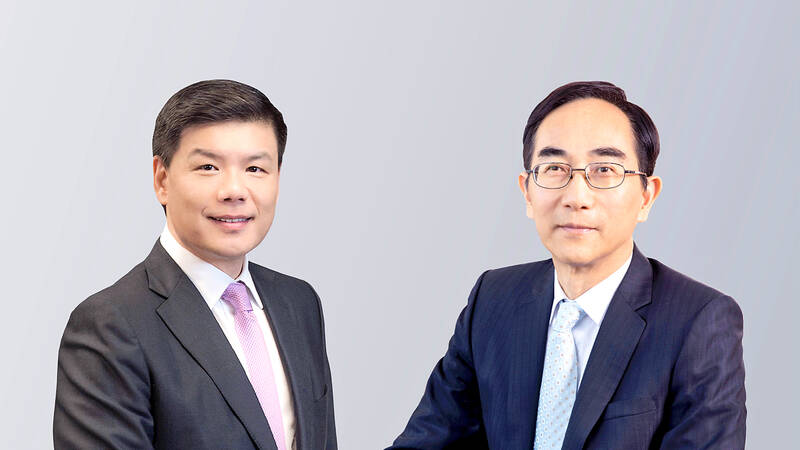China Development Financial Holding Corporation (hereinafter referred to as “CDF”) launched a high-level management team reshuffle. Today (26th), the Board of Directors approved Alan Wang to succeed as the Chairman and Paul Yang to take over as President & CEO. At the same time, CDF has appointed the positions of Chairman and President for its subsidiaries: Alan Wang will also serve as Chairman of KGI Life Insurance, Yu-ling Kuo will serve as President of KGI Life Insurance, and Paul Yang will serve as Chairman of KGI Bank. The new management team officially take office and will lead CDF to a new milestone.
CDF stated that under the leadership of Chairman, Alan Wang and President & CEO, Paul Yang, the new management team will fully utilize group resources, maximize business synergies, promote the growth of KGI Bank’s assets and distributions; build business and investment profitability growth momentum for KGI Life Insurance to respond to changes in the market environment; strengthen the development of KGI Securities’ wealth management and overseas business; deepen cooperation between CDIB Capital Group and Taiwan’s high-tech companies, and develop private equity products suitable for Taiwan’s wealth management market; improve the overall financial performance of CDF and maintain a consistently stable dividend policy.
Alan Wang and Yu-ling Kuo have a wealth of experiences in the insurance industry. As the insurance industry is about to align with IFRS17 and ICS, KGI Life has also recruited Winston Yung and Andy Lin to serve as Senior Executive Vice Presidents. Winston Rung has served as a director of McKinsey & Company (Hong Kong) and as CEO of the Hong Kong region, where he has successfully helped KGI Life in developing business distributions and digital transformation with remarkable achievement. He has rich experiences in insurance industry; Andy Lin, who has served as the CFO of CDF and KGI Bank, is well-versed in financial management affairs and has comprehensive experience within the group. In the future, they will assist KGI Life in smoothly integrating and maximizing synergies at the areas of business distribution, organizational momentum and financial management.

Photo courtesy of CDF
Paul Yang, CDF President & CEO and KGI Bank Chairman, has extensive experience in financial management, investment and M&A. In the past, during his tenure at CDF, he successfully transformed China Development Industrial Bank into a regional asset management firm and expanded CDF’s business roadmap in commercial banking and securities business through M&A. In the future, he will make good use of the advantages of the group and develop a balance approach in the three major pillars of personal banking, corporate banking and financial markets to steadily expand the scale of various businesses.
Steve Bertamini, the former President & CEO of CDF, vigorously promoted the company’s transformation during his tenure, introduced many advanced foreign systems to enhance employee engagement and NPS, and his achievements are outstanding. He will continue to serve as a Board of director at CDF. In addition, CDIB appointed David Chou as Vice Chairman at the beginning of the year. David Chou has served as Managing Director, Asia Investment Director and Global Partner of Goldman Sachs, and has more than 25 years of experience in the international financial market, providing M&A advisory services for American industrial, high-tech and manufacturing transactions.
CDF stated that through the high-level management reshuffle, CDF’s new management team will lead the group to open up a new pattern of innovation and become a leading financial institution in Asia.

South Korea’s equity benchmark yesterday crossed a new milestone just a month after surpassing the once-unthinkable 5,000 mark as surging global memory demand powers the country’s biggest chipmakers. The KOSPI advanced as much as 2.6 percent to a record 6,123, with Samsung Electronics Co and SK Hynix Inc each gaining more than 2 percent. With the benchmark now up 45 percent this year, South Korea’s stock market capitalization has also moved past France’s, following last month’s overtaking of Germany’s. Long overlooked by foreign funds, despite being undervalued, South Korean stocks have now emerged as clear winners in the global market. The so-called “artificial intelligence

NEW IDENTITY: Known for its software, India has expanded into hardware, with its semiconductor industry growing from US$38bn in 2023 to US$45bn to US$50bn India on Saturday inaugurated its first semiconductor assembly and test facility, a milestone in the government’s push to reduce dependence on foreign chipmakers and stake a claim in a sector dominated by China. Indian Prime Minister Narendra Modi opened US firm Micron Technology Inc’s semiconductor assembly, test and packaging unit in his home state of Gujarat, hailing the “dawn of a new era” for India’s technology ambitions. “When young Indians look back in the future, they will see this decade as the turning point in our tech future,” Modi told the event, which was broadcast on his YouTube channel. The plant would convert

‘SEISMIC SHIFT’: The researcher forecast there would be about 1.1 billion mobile shipments this year, down from 1.26 billion the prior year and erasing years of gains The global smartphone market is expected to contract 12.9 percent this year due to the unprecedented memorychip shortage, marking “a crisis like no other,” researcher International Data Corp (IDC) said. The new forecast, a dramatic revision down from earlier estimates, gives the latest accounting of the ongoing memory crunch that is affecting every corner of the electronics industry. The demand for advanced memory to power artificial intelligence (AI) tasks has drained global supply until well into next year and jeopardizes the business model of many smartphone makers. IDC forecast about 1.1 billion mobile shipments this year, down from 1.26 billion the prior

People stand in a Pokemon store in Tokyo on Thursday. One of the world highest-grossing franchises is celebrated its 30th anniversary yesterday.